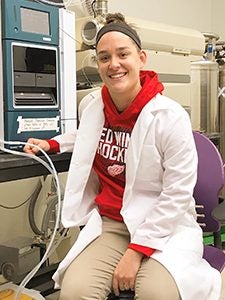Student Profile: Samantha Poppenfuse

ECU undergraduate researcher Samantha Poppenfuse is developing more effective screening processes for newborns.
Major: Molecular Biology and Chemistry
Mentors: Dr. Kimberly Kew and
Dr. Linda May
Department: Department of Biochemistry and Molecular Biology
Project Title: “Toxicology Screening of Umbilical Cords”
Samantha’s study investigates the use of umbilical cords in screening of opioids, cannabinoids, and stimulants among newborns as an alternative to meconium and urine. This would allow for more rapid treatment of newborns exposed to illicit drugs in utero identified with neonatal abstinence syndrome.
How did you get involved in undergraduate research?
During my second year at ECU I received an email regarding undergraduate research. Dr. Kimberly Kew was seeking students to assist in a different research project and accepted my help. I have always had an interest in research and am grateful for the opportunities I have been given since then.
Why did you choose your research topic?
My mother has been a nurse for 39 years, specifically in a neonatal intensive care unit, where I was introduced to medicine at a young age. Many of the newborns my mother has cared for have been identified with neonatal abstinence syndrome. After obtaining the knowledge of newborns exposure to illicit substances in utero, I have felt determined to educate and construct an avenue for change. This research is only one of the few opportunities I feel will allow me to do so.
What’s been your favorite part of conducting undergraduate research?
Conducting undergraduate research has allowed me to create connections and communicate with others involved in research. Throughout this process I have had the opportunity to meet with various students, faculty and physicians involved in research. Each individual has different focuses. Sharing connections and working with a variety of individuals with varying levels of skills and education has given me great appreciation for research and expanded my view of the field.
What challenges have you faced while conducting undergraduate research?
One of the greatest challenges for me while conducting undergraduate research was learning to expect the unexpected. When assumed results do not occur, it is easy to think of this as failure. I understand now that obtaining results is never a failure. Our expectations can cloud our critical thinking skills. Reevaluating the results has proven to guide my research in an unexpected path. Often this can lead to further findings and impactful results.
Why is your research important for the general public?
This research stands to improve the overall well-being of newborns identified with neonatal abstinence syndrome. These tiny individuals are the future of our society and cannot yet help themselves. Understanding the capabilities of our research for generations to come is vital to our society’s potential and future growth. We should strive to leave the world a better place than how we found it.
What’s your ultimate goal or accomplishment that you hope your research will help you achieve?
I hope this research will prove successful and allow more rapid screening, as well as identification of neonatal abstinence syndrome, in newborns. I also hope this will grant me the experience to further understand the impact research can have on medicine. I hope to initiate more clinical research expectations among the physician assistant field.
Do you have any advice for other students interested in conducting undergraduate research?
Step outside of your comfort zone. When you find an opportunity that makes you nervous take the risk and apply yourself. The best way to learn is to experience new things and make mistakes. Being an undergraduate student, making mistakes is our job. Make as many as you can.
